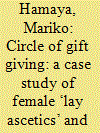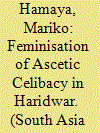| Srl | Item |
| 1 |
ID:
158941


|
|
|
|
|
| Summary/Abstract |
This article investigates everyday practices of begging among female ‘lay ascetics’ in Haridwar, North India. The subject of female asceticism or renunciation in Hinduism has been far less examined than that of male renunciation. Recent feminist-conscious studies have pointed out that female ascetics are generally marginalized within, or completely excluded from, male-dominated ascetic communities, albeit some charismatic female gurus do manage to establish a measure of authority. But gender-based inequality is not the only form of inequality that matters here. This article explores the lives of female ‘lay ascetics’ who are regarded as neither authentic renouncers nor ordinary householders. While male ascetics are prioritized in receiving alms, most female ascetics must struggle to obtain alms through making use of their social networks. Female ascetics cooperate with each other in this for both their mutual advantage and for spiritual reasons. Yet serious competition over alms can and does arise, which can generate moral dilemmas and severe conflict. Through ethnographic descriptions of their gift exchanges, this article will clarify how female ascetics form social networks which are neither completely obligatory nor completely free.
|
|
|
|
|
|
|
|
|
|
|
|
|
|
|
|
| 2 |
ID:
170178


|
|
|
|
|
| Summary/Abstract |
Case studies of male–female ascetic couples in Haridwar in North India complicate the widespread knowledge that male Hindu renouncers are supposed to observe celibacy. Based on extended ethnographic work, this article investigates specifically how female ascetics tackle the dominant androcentric discourses and practise celibacy from a female point of view, focussing on their practice of sevā or spiritual service. The article argues that while female ascetics do not object to the androcentric ideology of celibacy, they follow it only partly, switching their focus from sexual abstinence to devotional sevā. Doing this, female ascetics value controlling emotion more than controlling sexual desire. Through the practice of sevā, they aim for fostering an attitude of devotion as a feminised manifestation of their efforts towards reaching spiritual attainment.
|
|
|
|
|
|
|
|
|
|
|
|
|
|
|
|